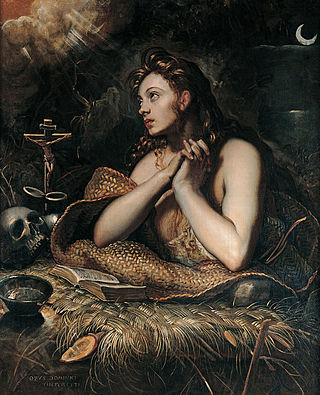
Mary Magdalene was a woman who, according to the four canonical gospels, traveled with Jesus as one of his followers and was a witness to his crucifixion and resurrection. She is mentioned by name twelve times in the canonical gospels, more than most of the apostles and more than any other woman in the gospels, other than Jesus's family. Mary's epithet Magdalene may be a toponymic surname, meaning that she came from the town of Magdala, a fishing town on the western shore of the Sea of Galilee in Roman Judea.
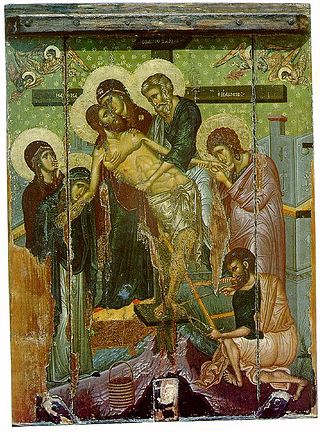
Joseph of Arimathea is a Biblical figure who assumed responsibility for the burial of Jesus after his crucifixion. Three of the four canonical Gospels identify him as a member of the Sanhedrin, while the Gospel of Matthew identifies him as a rich disciple of Jesus. The historical location of Arimathea is uncertain, although it has been identified with several towns. A number of stories about him developed during the Middle Ages.
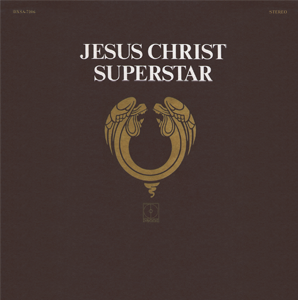
Jesus Christ Superstar is a sung-through rock opera with music by Andrew Lloyd Webber and lyrics by Tim Rice. Loosely based on the Gospels' accounts of the Passion, the work interprets the psychology of Jesus and other characters, with much of the plot centered on Judas, who is dissatisfied with the direction in which Jesus is steering his disciples. Contemporary attitudes, sensibilities and slang pervade the rock opera's lyrics, and ironic allusions to modern life are scattered throughout the depiction of political events. Stage and film productions accordingly contain many intentional anachronisms.
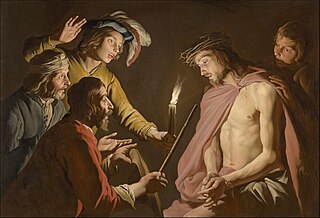
The Passion is the short final period before the death of Jesus, described in the four canonical gospels. It is commemorated in Christianity every year during Holy Week.

The Greatest Story Ever Told is a 1965 American epic religious film about the retelling of the Biblical account about Jesus of Nazareth, from the Nativity through to the Ascension. Produced and directed by George Stevens, with an ensemble cast, it features the final film performances of Claude Rains and Joseph Schildkraut.

The life of Jesus is primarily outlined in the four canonical gospels, which includes his genealogy and nativity, public ministry, passion, prophecy, resurrection and ascension. Other parts of the New Testament – such as the Pauline epistles which were likely written within 20 to 30 years of each other, and which include references to key episodes in the life of Jesus, such as the Last Supper, and the Acts of the Apostles, which includes more references to the Ascension episode than the canonical gospels also expound upon the life of Jesus. In addition to these biblical texts, there are extra-biblical texts that Christians believe make reference to certain events in the life of Jesus, such as Josephus on Jesus and Tacitus on Christ.

Barabbas is a 1961 religious epic film directed by Richard Fleischer for Dino De Laurentiis Cinematografica, expanding on the life of Barabbas, from the Christian Passion narrative in the Gospel of Mark and other gospels. It stars Anthony Quinn, Silvana Mangano, Katy Jurado, Arthur Kennedy, Harry Andrews, Ernest Borgnine, Vittorio Gassman, and Jack Palance. The screenplay is based on Nobel Prize-winner Pär Lagerkvist's 1950 novel of the same title.
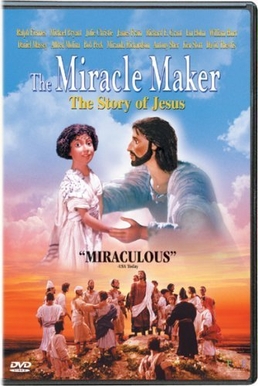
The Miracle Maker sometimes subtitled The Story of Jesus, is a 1999 Welsh-Russian stop motion-animated film directed by Derek Hayes and Stanislav Sokolov.
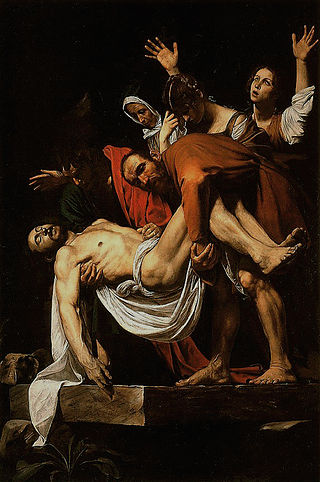
The stolen body hypothesis posits that the body of Jesus Christ was stolen from his burial place. It theorises that his tomb was found empty not because he was resurrected, but because the body had been hidden somewhere else by the apostles or unknown persons. Both the stolen body hypothesis and the debate over it presume the basic historicity of the gospel accounts of the tomb discovery. The stolen body hypothesis finds the idea that the body was not in the tomb plausible – such a claim could be checked if early Christians made it – but considers it more likely that early Christians had been misled into believing the resurrection by the theft of Jesus's body.

Matthew 27 is the 27th chapter in the Gospel of Matthew, part of the New Testament in the Christian Bible. This chapter contains Matthew's record of the day of the trial, crucifixion and burial of Jesus. Scottish theologian William Robertson Nicoll notes that "the record of this single day is very nearly one-ninth of the whole book".
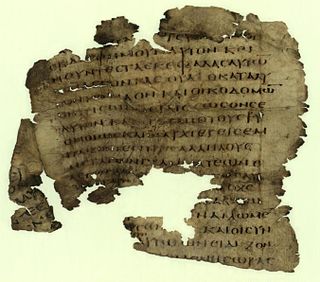
Mark 15 is the fifteenth chapter of the Gospel of Mark in the New Testament of the Christian Bible. This chapter records the narrative of Jesus' passion, including his trial before Pontius Pilate and then his crucifixion, death and entombment. Jesus' trial before Pilate and his crucifixion, death, and burial are also recorded in Matthew 27, Luke 23, and John 18:28–19:42.
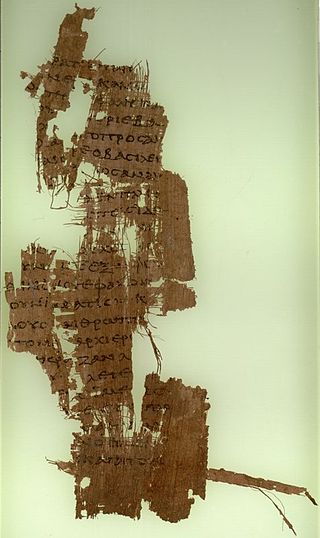
John 19 is the nineteenth chapter of the Gospel of John in the New Testament of the Christian Bible. The book containing this chapter is anonymous, but early Christian tradition uniformly affirmed that John composed this Gospel. This chapter records the events on the day of the crucifixion of Jesus, until his burial.

The Last Temptation of Christ is a 1988 epic religious drama film directed by Martin Scorsese. Written by Paul Schrader with uncredited rewrites from Scorsese and Jay Cocks, it is an adaptation of Nikos Kazantzakis' controversial 1955 novel of the same name. The film, starring Willem Dafoe, Harvey Keitel, Barbara Hershey, Andre Gregory, Harry Dean Stanton and David Bowie, was shot entirely in Morocco.

In Eastern Orthodox Christian tradition the Myrrhbearers are the individuals mentioned in the New Testament who were directly involved in the burial or who discovered the empty tomb following the resurrection of Jesus. The term traditionally refers to the women who came with myrrh to the tomb of Christ early in the morning to find it empty. Also included are Joseph of Arimathea and Nicodemus, who took the body of Jesus down from the cross, anointed it with myrrh and aloes, wrapped it in clean linen, and placed it in a new tomb. In Western Christianity, the women at the tomb, the Three Marys or other variants are the terms normally used.

The Passion is a television drama serial produced by the BBC and HBO Films in association with Deep Indigo Productions. It tells the story of the last week in the life of Jesus. The serial was first proposed by Peter Fincham in 2006, on the success of the contemporary-set Manchester Passion. Writer Frank Deasy and producer Nigel Stafford-Clark were inspired to make a drama that opened up the story beyond the "vacuum" it is often told in. They did this by expanding the roles of Pontius Pilate and Caiaphas, and exploring the politics of Judea at the time. Deasy and Stafford-Clark were aided by scholar Mark Goodacre, with whom they put together an extensive research manual about the topic.
Witness: Five Plays from the Gospel of Luke was a series of five 45-minute radio plays by Nick Warburton based on the Gospel of Luke, first broadcast from 17 to 21 December 2007 as part of BBC Radio 4's Afternoon Play strand. They were directed by Jonquil Panting. Jesus and the disciples were portrayed in regional accents, a trope in radio retellings of the Gospel stories since Dorothy L. Sayers' The Man Born to Be King. Upper class characters were presented in Received Pronunciation, city-folk in Jerusalem in London working-class accents, and Romans such as Pilate and the Centurion in an American accent.

The Scriptural Way of the Cross or Scriptural Stations of the Cross is a modern version of the ancient Christian, especially Catholic, devotion called the Stations of the Cross. This version was inaugurated on Good Friday 1991 by Pope John Paul II. The Scriptural version was not intended to invalidate the traditional version. Rather it was meant to add nuance to an understanding of the Passion.

Son of God is a 2014 American epic biblical film directed by Christopher Spencer, and produced by Mark Burnett and Roma Downey. The film retells the life of Jesus and is an adaptation of the ten-hour miniseries The Bible, which aired in March 2013 on the History channel, and immediately following the movie begins another TV series called A.D. The Bible Continues.
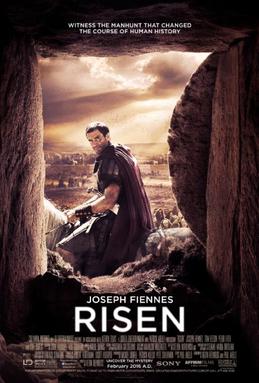
Risen is a 2016 biblical drama film directed by Kevin Reynolds and written by Reynolds and Paul Aiello. An American-Spanish co-production, the film stars Joseph Fiennes, Tom Felton, Peter Firth, and Cliff Curtis, and details a Roman soldier's search for Jesus's body following his resurrection. Columbia Pictures released the film to theaters in the United States on February 19, 2016. It received mixed reviews and grossed $46 million worldwide.

Mary of Nazareth is a 2012 Italian-German-Spanish television movie directed by Giacomo Campiotti. It focuses on life events of Mary of Nazareth, Mother of Jesus, and Mary Magdalene.



















